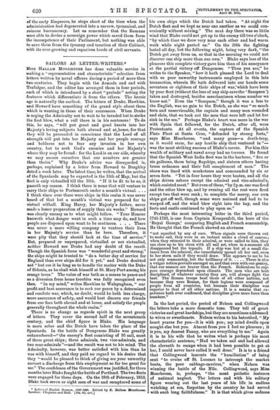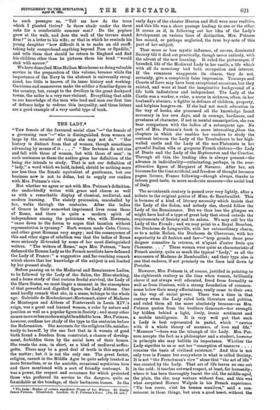SAILORS AS LETTER-WRITERS.*
MISS HALLAM MOORROUSE has done valuable service in making a " representative and characteristic" selection from letters written by naval officers during a period of more than two centuries. They begin with the Armada and end with Trafalgar, and the editor has arranged them in four periods, each of which is introduced by a short " prelude " noting the features which differentiate it from the others. The heroic age is naturally the earliest. The letters of Drake, Hawkins, and Howard have something of the grand style about them which is wanting in those of their successors. When Drake is urging the Admiralty not to wait to be invaded but to strike the first blow, what a roll there is in his sentences ! To do this, he says, " will put great and good hearts into her Majesty's loving subjects both abroad and akhome, for that they will be persuaded in conscience that the Lord of all strength will put into her Majesty and her people courage and boldness not to fear any invasion in her own country, but to seek God's enemies and her Majesty's where they may be found : for the Lord is on our side, whereby we may assure ourselves that our numbers are greater than theirs." Why Drake's advice was disregarded is, perhaps, explained by a letter from Howard to Burghley dated a week later. The latest time, he writes, that the arrival of the Spaniards may be expected is the 15th of May, but the fleet is only victualled till the 18th. " If it be fit to be so, it passeth my reason. I think there is none that will venture to carry their ships to Portsmouth under a month's victual. . . . I think since ever there were ships in this realm it was never heard of that but a month's victual was prepared for to victual withal]. King Harry, her Majesty's father, never made a lesser preparation of supply than six weeks." Howard was clearly uneasy as to what might follow. " Your Honour inoweth what danger want in such a time may do, and how people are disposed upon want to be mutinous. . . . There was never a more willing company to venture their lives in her Majesty's service than be here. Therefore, it were pity that they should lack at the time of service." But, prepared or unprepared, victualled or not victualled, neither Howard nor Drake had any doubt of the result. Though the Spanish force was " wonderful great and strong," the ships might be trusted to " do a better day of service for England than ever ships did for it yet," and Drake doubted not " but ere it be long so to handle the matter with the Duke of Sidonia, as he shall wish himself at St. Mary Port among his orange trees." The value of war both as a means to peace and as a diversion from home troubles was fully recognised even then. "In my mind," writes Hawkins to Walsyngham, " our profit and best assurance is to seek Our peace by a determined and resolute war, which, no doubt, would be both less charge, more assurance of safety, and would best discern our friends from our foes both abroad and at home, and satisfy the people generally throughout the whole realm."
There is no change as regards spirit in the next group of letters. They cover the second half of the seventeenth century, and the chief figure is Blake. His language is more sober and the Dutch have taken the place of the Spaniards. In the battle of Dungeness Blake was greatly outnumbered—" the enemy's fleet consisting of 95 sail, most of them great ships ; three admirals, two vice-admirals, and two rear-admirals "—and the result was not to his mind. The Admiralty, however, was better satisfied with him than he was with himself, and they paid no regard to his desire that they " would be pleased to think of giving me your unworthy servant a discharge from this employment so far too great for me." The confidence of the Government was justified, for three months later Blake fought the battle of Portland. The two fleets were engaged for three days. On the 18th of February, 1653, Blake took seven or eight men of war and recaptured some of
• Letters of English Seamen, 1587-049. Edited by E. Hallam Moorhonse. London Chapman and Hall. [10a. 6d. net.]
his own ships which the Dutch had taken. "At night the Dutch fleet and we kept as near one another as we could con- veniently without mixing." The next day there was so little wind that Blake could not get up to the enemy till two o'clock, "by which time we drew very near each other and had warm work while night parted us." On the 20th the fighting lasted all day, but the following night, being very dark, "the Dutch got away from us, so that in the morning we could not discover one ship more than our own." Blake says less of the pleasure this complete victory gave him than of his annoyance at the partial victory off Dungeness. " Thus you see," he writes to the Speaker, " how it bath pleased the Lord to deal with us poor unworthy instruments employed in this late transaction, wherein He hath delivered into our hands some seventeen or eighteen of their ships of war,'which have been by your fleet (without the loss of any ship save the a Sampson') taken and destroyed, besides merchantmen whose number we know not." Even the "Sampson," though it was a loss to the English, was no gain to the Dutch, as she was "so much torn and unserviceable, the captain and many men wounded and slain, that we took out the men that were left and let her sink in the sea." Perhaps Blake's heart was more in the war with Spain that followed, for the Dutch, after all, were Protestants. At all events, the capture of the Spanish Plate Fleet at Santa Cruz, " defended by strong forts," says Miss Moorhanse, " and many guns—a death-trap, as it would seem, for any hostile ship that ventured in "- was the most striking success of Blake's career. For him this wealth of military and naval array had no terrors. He found that the Spanish West India fleet was in the harbour, " five or six galleons, three being flagships, and sixteen others having brass ordnance and their full complement of men." The shore was lined with musketeers and commanded by six or seven forts. "Yet in four hours they were beaten, and all the ships driven ashore except the admiral and vice-admiral's, which resisted most." But even of these, "by 2p.m. one was fired and the other blew up, and by evening all the rest were fired
except two that were sunk ; to complete the mercy, our own ships got off well, though some were maimed and had to be warped off, and the wind blew right into the bay, and the
forts and castle continued to play upon us."
Perhaps the most interesting letter in the third period, 1741-1783, is one from Captain Kempenfelt, the hero of the 'Royal George,' comparing English and French seamanship. He thought that the French showed an alertness
"not equalled by any of ours. When signals were thrown out to snake sail, they were in an instant under a cloud of canvas ; when they returned to their admiral, or were called to him, they ran close up to his stern with all sail set, when in a moment all disappeared but the topsails. If a ship was but at a small dis- tance from the admiral, she immediately spread all her sail, even to her stern sails if they would draw. This appears to me to be not only seamanship, but the brilliancy of it There is also a vulgar notion prevails amongst us, and that even with our gentry, that our seamen are braver than the French. Ridiculous to sup- pose courage dependent upon climate. The men who are best disciplined, of whatever country they are, will always fight the best. The Roman troops beat those of all other nations, not because they were Roman, for their legions were composed of people from all countries, but because their discipline was superior to that of all other nations. It is a maxim that ex- perience hath ever confirmed, that discipline gives more force than numbers."
In the last period, the period of Nelson and Collingwood the letters take a more domestic tone. They tell of great victories and great hardships, but they are sometimes addressed to wives or sweethearts. Nelson writes to his betrothed, " heart yearns for you—it is with you; my mind dwells upon nought else but you. Absent from you I feel no pleasure ; it is you, my dearest Fanny, who are everything to me." Again it is to his wife that he writes what is perhaps his most characteristic sentence, " Had we taken sail and had allowed the eleventh to escape when it had been possible to get at her, I could never have called it well done." It is to a friend that Collingwood laments the " humiliation" of being sent " to cruise off St. Luccars to intercept the market boats, the poor cabbage-carriers," when Nelson was winning the battle of the Nile. Collingwood, says Miss Moorhouse, is, perhaps, " the most pathetic instance of national neglect. The letters end with his solitary figure wearing out the last years of his life in endless watching at sea, forgotten by the country he had served with such long faithfulness." It is that which gives sadness to such passages as, " Tell me how do the trees which I planted thrive? Is there shade under the three oaks for a comfortable summer seat P Do the poplars grow at the walk, and does the wall of the terrace stand firm?" in a letter to his wife; or that in which he reminds his young daughter "how difficult it is to make an old snuff- taking lady comprehend anything beyond Pam or Spadille," and tells them that should he return to England and find his children other than he pictures them his head " would sink with sorrow."
We have described Miss Hallam Moorhouse as doing valuable service in the preparation of this volume, because while the importance of the Navy in the abstract is universally recog- nised, too little is known of its inner history and working. Garrisons and manceuvres make the soldier a familiar figure in the country, but, except to the dwellers in the great dockyard towns, the sailor is a very rare visitant. Everything that adds to our knowledge of the men who lead and man our first line of defence helps to redress this inequality, and these letters are a good example of a very useful type of book.



























































 Previous page
Previous page